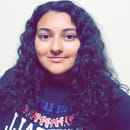On Thursday, September 26, 2019, the English Honor Society at Stephen F. Austin State University hosted an annual event that recognized the topic of banned books across the world. Students, faculty, and staff signed up beforehand to read excerpts from a banned book that was previously listed. If the participants wished, they could try to get their hands on a printed or online copy of a banned book.
Photo of Mr. Dylan Parkhurst by LaShauna Bell
According to the American Library Association, National Banned Book Week spans from September 22-28 this year, as the duration is typically the final full week of September. This year’s theme was: “Censorship Leaves Us in the Dark. Keep the Light On!” Essentially, this phrase emphasizes the restrictions and the views of certain groups of individuals that keep all types of writers from applying their free speech. Writers are pouring their hearts out to better communicate and relate to their audiences, yet there are individuals that only focus on specific aspects of their work (i.e. foul language, sexual situations, violence, etc.). Why not focus on the emotional cycle from the book to the reader, and vice versa, or the moral of the book?
Photo: American Library Association
10 Familiar Titles: Challenged and Banned Books
(Here are a few commonly challenged and/or banned books researched by GoodReads, but there are hundreds of others.)
- To Kill a Mockingbird by Harper Lee
- The Catcher in the Rye by J.D. Salinger
- The Great Gatsby by F. Scott Fitzgerald
- The Adventures Of Huckleberry Finn by Mark Twain
- Lord of the Flies by William Goulding
- The Handmaid’s Tale by Margaret Atwood
- Of Mice and Men by John Steinbeck
- The Diary of a Young Girl by Anne Frank
- The Hunger Games series by Suzanne Collins
- The Harry Potter series by J.K. Rowling
Interview
At the event, SFASU Sophomore Cia D. Rollins, Creative Writing and Art Major, decided to read a short excerpt from Fahrenheit 451—I hope most of you are, at least, familiar to the title. In a brief interview, Rollins provided insightful answers when asked about her opinions.
When Rollins was asked why she read her excerpt, she said, “I was sort of unprepared and needed a book, and as soon as it was recommended, I read from it. Kinda wish I read The Color Purple instead, but F-451 is a good book, too.” One of her favorite books is, in fact, The Color Purple, which is mostly why she wished to have shared it with the audience so they may also appreciate the book’s value to the reader.
Photo of Cia D. Rollins by Viviana Gutierrez
I asked Rollins why she thought it was important to recognize banned books from across the globe. Her response was very thought-provoking:
“Usually, people censor things they don’t agree with. It’s an immature tactic of controlling the media your audience digests, because they’re still going to think about and engage in the things you don’t approve of. It’s like the Dark Ages after the fall of the Roman Empire (in the west) when we had the medical means to treat diseases but remained ignorant to their uses because of an irrational fear of everything being sinful. YouTube is on a similar downward spiral by demonetizing its creators if they do something “unfriendly,” cutting the lifelines of many great rookie and veteran content creators. It’s unfair, and if we want to advance–not just as a civilization…we need to be able to accept the voices and ideas that challenge our perspective of the world. Keeping everything the same is stagnation, and stagnation as a human is death.”
When asked about the perceptions and reactions of people on eccentrically different books: “People are entitled to their reactions. There’s no wrong reactions. Disgust, appreciation, hatred, infatuation…seeing and understanding how people feel is what helps us understand what needs to change to a better society.”
On how this issue should be handled before books are banned: “People are going to be offended no matter what, and censorship will persist where free speech thrives, and vice versa. I think continuing to spread awareness about censorship and its harm to humanity’s progress should help people understand why literature must not be banned.”
Now, I ask you, the reader, to think about these questions. What should be the right thing to do regarding banned books?
References:
Banned Books Week (September 22-28, 2019). (2012). Retrieved from http://www.ala.org/advocacy/bbooks/banned
Banned & Challenged Classics. (2013). Retrieved from http://www.ala.org/advocacy/bbooks/frequentlychallengedbooks/classics
Best Banned, Censored, and Challenged Books (487 books). Retrieved from https://www.goodreads.com/list/show/1360.Best_Banned_Censored_and_Challe…


